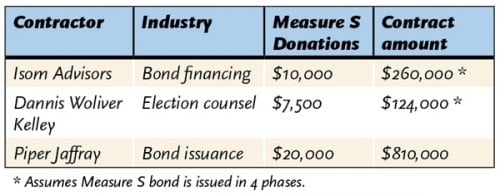Outside contractors fueled school bond
Half Moon Bay Review
October 26, 2012

A review of campaign finance records shows that private firms in architecture, engineering, financial consulting and law, all with a stake in school construction, contributed a total of $50,000 to the [Cabrillo Unified School District]“Yes on Measure S” campaign. That sum amounted to about half the money used by measure proponents to rally support among Coastside voters.
Some of those companies wrote checks to help pass Measure S while they were already working on preparing the bond on behalf of the school district. The San Francisco law firm Dannis Woliver Kelley donated $7,500 in April to help pass the bond, two months after its legal team won a $124,000 contract to serve as bond counsel for Measure S. The financial powerhouse Piper Jaffray contributed $20,000 in May, one month after it signed a contract with the district worth $810,000 to issue the bonds on the market.
These contracts were based on a contingency: If voters rejected Measure S, then the companies would receive only a fraction of their payment. The companies would be paid in full only if the bonds passed.
That outside money may have made the difference for Measure S. The bond passed in a razor-thin victory by a margin of about 100 votes.
The “Yes on Measure S” campaign was obligated under California Education Code to operate separately from the school district, although elected school board members still volunteered in leadership roles.
By accepting financial help from the school district’s own hired professionals, Measure S supporters followed a trend that has become common throughout California, said Anton Jungherr, executive director for the California League of Bond Oversight Committees. The practice is not illegal, he explained, but it presents a conflict of interest for school leaders making decisions with millions of dollars in bond money.
“I give you $30,000 and you give me a multi-million dollar contract,” he said. “It’s the same issue whether you do it before or after. It gives the appearance of a conflict.”
…
But in recent months, more government agencies are beginning to take action to stop what they perceive as a “pay to play” relationship between political leaders and contractors. Cities including San Francisco and Los Angeles have restrictions in place, in some cases banning contractors from making any political contributions.
Officials with the Municipal Securities Rulemaking Board, the federal agency overseeing public bond dealers, has begun considering tougher disclosure rules for political contributions made by bond consultants. The action was taken following a California Watch investigation that revealed bond underwriters, such as Piper Jaffray, had over the last five years thrown $1.8 million into successful school bond measures throughout the state. In nearly every case, the school districts later signed contracts with the same firms.